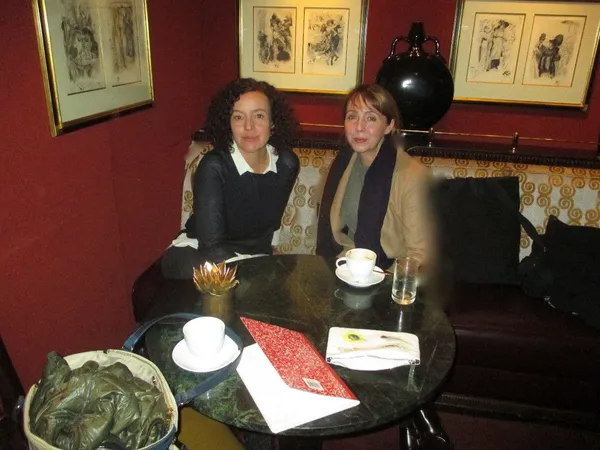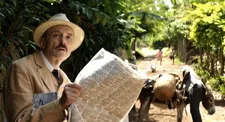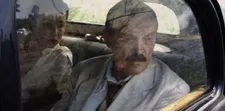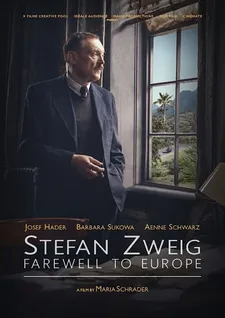 |
| Deutschland 83 star and Stefan Zweig: Farewell To Europe director Maria Schrader with Anne-Katrin Titze Photo: Anne-Katrin Titze |
Maria Schrader's Stefan Zweig: Farewell To Europe (Vor Der Morgenröte – Stefan Zweig In Amerika), co-written with Jan Schomburg, is a sharp and vital depiction of Zweig's life in exile (1936-1942), portrayed by Josef Hader with nuance and grace. Aenne Schwarz is Lotte, the writer's loyal second wife and the good spirit who organizes with their faithful interpreter/guide Vitor (Nahuel Pérez Biscayart) the couple's time in Brazil. Barbara Sukowa is Friderike, the writer's ex-wife. With a great Austrian accent the legendary Rainer Werner Fassbinder star (Berlin Alexanderplatz) and Margarethe von Trotta stronghold says the words unlike any other as she signals the years of the past married life with a single glance.
 |
| Josef Hader as Stefan Zweig: "I'm not Thomas Mann. I cannot send away all the petitioners." |
The cinematography of Wolfgang Thaler (Ulrich Seidel favourite) and costumes by Jürgen Döring (Olivier Assayas regular) make the lushness just the right kind of lush and never go overboard - not with the marvelous vegetation nor with period detail.
Maria Schrader joined me for a conversation at her hotel the morning after the International Emmy Awards gala, hosted by Alan Cumming. Deutschland 83, the show Maria stars in, took home the Drama Series honor and her colleagues were still celebrating the victory behind us in the cafe, while we were having coffee and croissant.
Stefan Zweig: Farewell to Europe is Austria's Oscar submission for the 89th Academy Awards and we began right here in New York.
Anne-Katrin Titze: Stefan Zweig was not particularly fond of New York. Do you understand his reluctance?
 |
| Lotte Zweig (Aenne Schwarz) with Stefan Zweig |
Maria Schrader; There's a nice quote in the movie: "I'm not Thomas Mann. I cannot send away all the petitioners. He manages to give each one of them just twenty minutes and with me they stay all afternoon long and I cannot free myself from all the questions and all the demands." But actually it was a movement throughout his life to go from the metropolitan cities rather to the country[side].
He went from Vienna to Salzburg, he went from London to Bath, New York to New Hampshire, Rio de Janeiro to Petrópolis. You see this amongst so many writers. Amos Oz cannot write a single word if he is not in the solitude.
AKT: The scene in New York, I felt is at the heart of the film because everything is interconnecting at that moment, the private and the political. As you were saying, he cannot say no and yet he has to say no to the people asking him for help. We see the private man who is so troubled by all these people wanting his help and it's understandable that they do. Because it's life or death.
 |
| "… knowing all the ambassadors, being able to have some influence - of course he felt this pressure." |
MS: And he helped. He helped so much. He really spent all he had. He was very, very active helping people with their flight from Europe. Just seeing the piles of envelopes on this desk - he was probably always aware of the hundreds and thousands of others who could not be helped.
AKT: At the same time in this scene you give great detail about the life there in exile. "Essex Street Market has no Marillenschnaps." It's a wonderful line. It shows the other side, the quotidian. Both go together. In many films this would have just been about the politics. You get the Chipso dishwashing flakes in there.
MS: It's also so much fun to research that, to spread the research, to not only go which writer is attending the PEN Congress [in Buenos Aires 1936], you know, searching for all those protocols, but also searching for where would you go shopping if you were living in Sheridan Square in 1942? And Essex Street Market seemed to be one of the biggest food markets by that time, also for delicacies like that. It's nice that you say that.
 |
| Friderike (Barbara Sukowa), the writer's ex-wife with Zweig in New York: "You do have the capacity to help people!" |
The more we read about Stefan Zweig, this whole issue, living life in exile, the more imminent the question became - what kind of movie can you do with this? From our point of view, looking back on that time, you sometimes think that everyone must have in every minute of the day thought about Hitler and how the world was about to be shaken. What we know now and they did not know - even people like Stefan Zweig, you are completely right, suffered from these contradictory forces.
Of course, feeling this responsibility as someone known world-wide, very wealthy in a very luxurious position, knowing all the ambassadors, being able to have some influence - of course he felt this pressure. What Friderike tells him: "You do have the capacity to help people!"
AKT: The performances are great. Barbara Sukowa gives one glance. Everything is in that. You can see what she is thinking. Actually both wives, Aenne Schwarz as well. Actually, I think I never heard Barbara speak with an Austrian accent.
![Stefan Zweig in Petrópolis, Brazil: "Actually it was a movement throughout his life to go from the metropolitan cities rather to the country[side]."](/images/newsite/Josef Hader 3_225.webp) |
| Stefan Zweig in Petrópolis, Brazil: "Actually it was a movement throughout his life to go from the metropolitan cities rather to the country[side]." |
MS: And she does it so well! She is so good. I was very strict about finding actors to echo the historic figures. Of course I looked in Austria at first for finding Friderike and did not. And then one of the producers said one day "How about Barbara Sukowa?"
Sometimes it's almost like a physical reaction on ideas throughout the process of making a movie. You instantly know that's the right choice. I also loved the idea of having Barbara and Josef Hader play a couple. I found that so wild. You don't probably know Josef Hader, since you live in the US?
AKT: Not that much. I have seen a film of his years ago - India.
MS: It's just a surplus if you know him. If you know him, then you watch the movie with different eyes because Josef Hader is truly a superstar. He is a superstar in Austria. There is no Austrian probably who wouldn't know Josef Hader. He is also well-known in Germany, but his background is comedy. He writes his own programs, he is like a stand-up comedian.
He takes a stand towards society, political questions, he is very sharp-tongued, very witty, very ironic and he created this stage character who is a melancholic, not really an intellectual - anyway, he did movies and in every movie he serves that stage character of his. He always has control and writes the scripts, or co-writes the scripts. So this part is actually the first time he takes on something completely different.
 |
| Stefan Zweig: Farewell To Europe poster |
AKT: He gave up control to you?
MS: Yes, he gave up control and he is for the first time in period costume. And for the first time a script with so many lines that someone else has written, first time approaching an historic character.
AKT: I thought he was very good. Is there footage of Stefan Zweig?
MS: Not much. Josef always likes to tell the story that there was a huge exhibition in Munich the year before we started shooting.
AKT: When did you shoot it?
MS: We were shooting in the summer 2015.
AKT: I interrupted you - you said the year before there was an exhibition?
MS: Yes, there was an exhibition where you could see Stefan Zweig at a garden party in Salzburg during the Festspiele talking to a fan. And this woman keeps talking. It's a silent piece of footage. He is unpleasantly touched by all these compliments.
AKT: He is embarrassed?
MS: Yeah, he is embarrassed by the compliments and almost intimidated and he has some kind of a shy body language. It was a wild idea to ask Josef Hader to play this. I enjoyed so much the look on the faces when people would ask me "Who is playing Stefan Zweig?" And I would say "Josef Hader". There was always this gasp "Really?" And a second later, "Wow, that's a good idea." So it's kind of a casting coup. He would prepare a lot and have language lessons, you know, all the French and Spanish.
Coming up - The PEN Congress of 1936, translators, flowers, a dedication to producer Denis Poncet, editing a Blue Danube performance with Hansjörg Weißbrich, the mystery of movies, Wes Anderson's Zweig advisor for The Grand Budapest Hotel, George Prochnik, Terence Davies on Max Ophüls' Letter From An Unknown Woman, Maria being on the jury of the Berlin Film Festival with Andrzej Wajda, Gong Li, Walter Salles, and Marisa Paredes when they honored Paul Thomas Anderson's Magnolia, the Villa Aurora, and more.





















